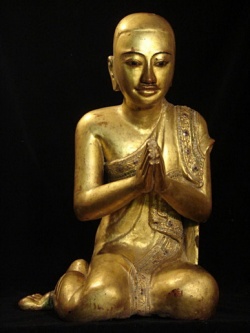Nanda (step-brother of The Buddha)
Nanda was the step-brother of The Buddha; and his mother was the younger sister of Maha Maya.
Nanda
[難陀] (Skt; Jpn Nanda)
(1) Shakyamuni's Disciple and younger half brother, the son of Shuddhodana and Shakyamuni's maternal aunt Mahaprajapati. He is said to have been particularly handsome and was known as Sundarananda (Beautiful Nanda). After Shakyamuni renounced the secular World, Nanda took his place as heir to King Shuddhodana. When Shakyamuni returned to Kapilavastu for the first time following his Awakening, Nanda was persuaded to join the Buddhist Order. He was for some time tormented because he loved his wife Sundariwholeheartedly. Under Shakyamuni's guidance, however, he renounced secular Life and dedicated himself to Buddhist practice, attaining the state of Arhat.
(2) A Disciple of Shakyamuni, known also as the cowherd Nanda because that was his vocation before entering the Buddhist Order. It is said that King Bimbisara, while playing host to Shakyamuni Buddha and his disciples for three months, called upon Nanda the cowherd to furnish them daily with milk and other dairy products. Nanda complied, and to reward his industry Bimbisara introduced him to Shakyamuni. When Nanda heard Shakyamuni, a former prince, speak knowledgeably about cowherding, he was convinced of The Buddha's all-encompassing Wisdom and became his Disciple.
(3) A poor woman in Shravastiwho was a follower of Shakyamuni Buddha. According to the Sutra on the Wise and the Foolish, she wished to make an Offering to The Buddha. Only able to afford to buy oil for a single lamp, she offered this with the vow to eliminate the darkness of the sufferings of all people. Other lamps offered to The Buddha eventually went out, but hers continued to burn throughout the night. Maudgalyayana, known as foremost in transcendental powers, attempted to blow it out but could not. Shakyamuni Buddha then prophesied that the poor woman would attain Enlightenment, and thereafter she was revered by the people of The country.
(4) One of the ten great scholars of the Consciousness-Only School in India who wrote commentaries on Vasubandhu's Thirty-Stanza Treatise on the Consciousness-Only Doctrine. He is Thought to have lived in the sixth century.
Once visiting Kapilavatthu he visited his half brother’s palace, who was getting married to the most gracious woman of the time, whose name was Janapadakalyani Nanda. (She was called so because her graceful appearance was to grace the whole of the janapada). Upon visiting Nanda Buddha asked him to carry his alms bowl to his Vihara. So, Nanda left the palace and kept his prospective bride waiting.
In the Vihara Buddha inspired Nanda to renounce the worldly Life for the sake of eternal bliss. Though he was inspired by the words of The Buddha and accepted the Renunciation, yet his resolve was infirm and half-hearted. Besides, he pined for his pretty bride with strong sensual Desires, which gradually broke his health. The Buddha read his Mind and knew the remedy.
One day, The Buddha asked him to accompany him to the Himalayas. On the way he showed him the charred Body of a female monkey. To examine the intensity of his brother’s sensual passions he then asked him whether his bride was prettier than the charred Body of the animal. Nanda answered in affirmative.Buddha then took him to the Tavatimsa, where Sakka and his nymphets extended every Hospitality to them. There, The Buddha again asked Nanda whether Janapadakalyani Nanda was prettier than those nymphets. Nanda then answered in negative. The Buddha then promised him to get him any of those nymphets as his espouse if he would lead a monastic Life. Nanda in his eagerness agreed. But when he reached the Monastery where the eighty Monks questioned his pledge for Monk-hood, he felt ashamed. Soon he mustered up his courage and strove for attainment of the arahatahood. And by and by he achieved his target.
He then came to The Buddha and absolved him of his Tavatimsa promise.
See Theragatha 157 f.; Theragatha Atthakatha i.276 ff.; Dhammapada Atthakatha i. 96-105, 1.103;
